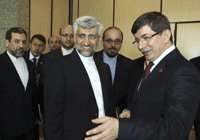
Turkey's foreign minister Ahmet
Davutoglu welcomes the
Iranian team
Iran, big powers to meet again in Baghdad
Istanbul, April 15, 2012
Negotiators from Tehran and six world powers finally resumed talks yesterday and found at least enough common ground to agree to meet again next month.
With threats of war hanging over an already unsettled Middle East, US and other Western diplomats welcomed their Iranian counterparts willingness in Istanbul on Saturday to discuss their nuclear activities - something they had refused since early last year.
But though they will meet again, in Baghdad on May 23, they remained poles apart. Iran called for a lifting of sanctions and recognition its uranium enrichment is for purely peaceful ends.
The United States demanded urgent action to prove the Islamic Republic is not seeking the potential nuclear arsenal which Washington and ally Israel threaten to eliminate by force.
'While the atmosphere today was positive and good enough to merit a second round, we continue to stress ... that there is urgency for concrete progress and that the window for a diplomatic resolution is closing,' said a senior US official.
Over the past year, Israeli talk of 'pre-emptive' strikes if Iran does not stop working on some aspects of nuclear technology have raised fears of war - and oil prices - especially since estimates of how much longer Tehran might need to build an atomic device, should it wish, have shortened to a year or two.
A resumption of dialogue may help dampen anxieties, although hawkish voices in Israel and Western states have long questioned Tehran's good faith and accuse it of using talks to buy time for its nuclear scientists - some of whom have been killed in what Iran says is a covert campaign by Israeli and Western agencies.
Publicly, negotiators on all sides emphasise the positive. 'We expect that subsequent meetings will lead to concrete steps towards a comprehensive negotiated solution which restores international confidence in the exclusively peaceful nature of the Iranian nuclear programme,' said Catherine Ashton, the EU foreign policy chief who leads negotiations for the six powers.
The group comprises the five permanent members of the U.N.
Security Council - Russia, the United States, China, France and Britain - along with Germany. It is known as the P5+1.
Calling Saturday's talks 'constructive and useful', Ashton said: 'We want now to move to a sustained process of dialogue.'
The meeting in Baghdad, a rare friendly venue for Iranians in the Arab world, would be part of a 'step-by-step' approach.
Junior officials would meet again before May 23, she said.
One senior diplomat present in Istanbul said agreeing to Iran's request for a meeting in troubled Iraq showed commitment by the negotiators - 'Baghdad was a test. They are saying: 'If you really want to talk to us, then come and talk to us'.'
Sidestepping questions of how long talks could continue before impatient Western powers, or Israel, might cut them short by force, the envoy said: 'I would much rather spend a long day in Istanbul than be picking up the pieces at the end of a war.'
Chief Iranian negotiator Saeed Jalili made clear that Iran had no intention of accepting a key demand, that it halt plants which enrich uranium to 20 percent fissile material - far beyond the quality needed to generate the electricity which it says the oil-rich country requires to develop economic prosperity.
Nonetheless, however remote a final accord may be between the Islamic Republic and its adversaries, a return to the negotiating table may calm nerves after 15 angry months.
In that time, the West has imposed new crippling economic sanctions while Iran, watching its key regional ally Syria collapse into internal strife, has threatened to blockade oil tankers. Israel, fearful a nuclear Iran would jeopardise its very survival, has been planning possible 'pre-emptive' strikes.
One diplomat from the six said Iran's willingness to at least discuss its nuclear programme marked a shift away from the stalemate which marked previous meetings early last year: 'We spent the whole day discussing the nuclear issue.' - Reuters







